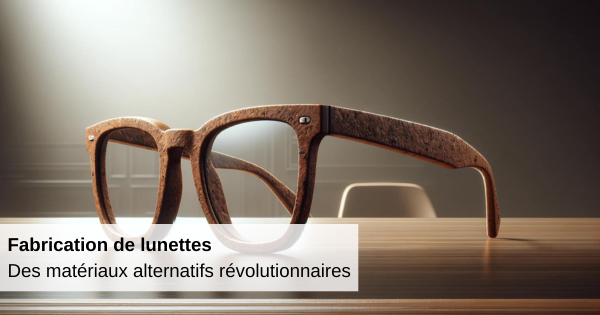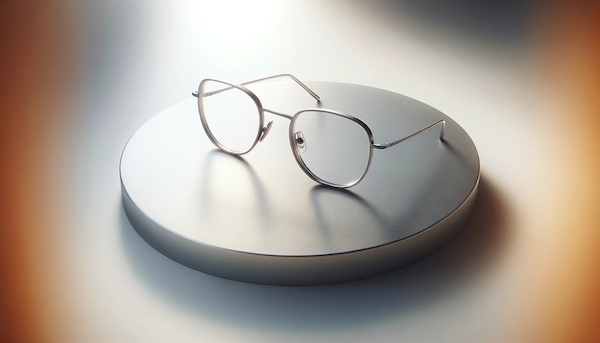Alternative materials that are revolutionizing eyewear manufacturing

Professionals and consumers alike are actively seeking more economical and environmentally friendly alternatives without compromising style, comfort, or functionality. It is in this context that production innovations arise: innovative materials radically transforming the manufacture of glasses. From ultra-light titanium to colored cellulose acetate, and now, even more eco-friendly options like recycled coffee grounds, the eyeglass frame industry is undergoing a true metamorphosis. Innovative materials are no longer just a response to calls for more sustainable fashion, but also a way to push the boundaries of optical technology and design.
Manufacturing of glasses: discovery of so-called “advanced” materials
In a constantly evolving sector like optics and eyewear, material innovation is at the forefront of market transformation . Manufacturers, in a perpetual search for differentiation and compliance with the expectations of modern consumers, are increasingly turning to materials that are both innovative and environmentally friendly. Titanium, Ultem and bio-acetate are eloquent examples of this trend, offering sustainable and efficient alternatives to traditional plastics derived from petroleum.
Titanium , renowned for its resistance and lightness, is a preferred choice for consumers looking for comfort and durability. Hypoallergenic and extremely resistant to corrosion, it offers an ideal frame option for those who demand quality and finesse without compromise. Additionally, its ability to be easily colored and molded makes it a favorite among eyewear designers looking to combine aesthetics and functionality.

Ultem , a thermoplastic polymer, is distinguished by its exceptional lightness and high impact resistance. Used in various applications ranging from aeronautical components to medical devices, Ultem has established itself in the eyewear industry for its flexibility and ability to withstand extreme temperatures, making it a perfect solution for sturdy and durable frames. lightweight suitable for intense daily use.
Finally, bio-acetate , an ecologically responsible version of cellulose acetate, stands out for its biodegradable nature. Unlike its traditional counterpart, bio-acetate does not contain petroleum-based plasticizers, making it fully compostable. This unique property opens the door to glasses that are not only stylish and colorful, but also aligned with the principles of environmental sustainability. These materials are not only transforming the appearance of eyeglass frames, but also redefining production and consumption standards within the industry.
Innovation for sustainability: the case of Ochis Coffee
Ochis Coffee , a Ukrainian start-up, stands out in the optical industry for its innovative and eco-friendly approach to frame production. Founded by Maksym Havrylenko, from a family of opticians and with 15 years of experience in the field, the brand has adopted a pioneering approach by integrating organic materials such as coffee grounds and natural linen into manufacturing. glasses.
The choice of these materials is not trivial. Coffee grounds, a commonly discarded residue, prove to be a valuable resource in creating eyeglass frames that are both lightweight and sturdy. Mixed with natural linen fibers and bonded by a vegetable oil-based biopolymer, processed coffee grounds give the frames a unique property: they are biodegradable one hundred times faster than their traditional plastic counterparts . This feature not only meets the needs of durability but also enriches the user experience, with the frames giving off a slight smell of freshly roasted coffee.

In addition, Ochis Coffee frames are not only eco-friendly. They are designed to be extremely lightweight and water resistant, providing comfort and practicality to wearers. The manufacturing process includes 39 careful steps, ensuring the high quality and elegant finish of the products. Ochis Coffee's initiative perfectly illustrates how material innovation can redefine the optical industry, not only in terms of sustainability but also by offering consumers conscious fashion options that combine style, comfort, and respect. of the environment. This approach could serve as a model for other players in the sector, encouraging a broader transition towards planet-friendly production practices.


